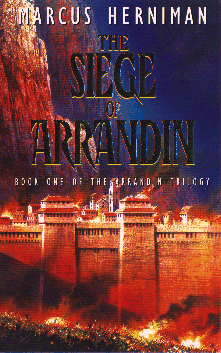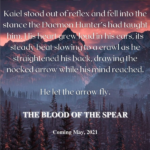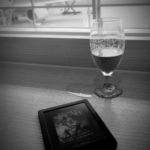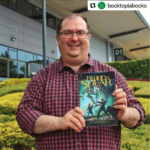… but well worth the read if you can find it. I wrote this reveiw many many years ago, and while it is more flowery than I (like to think) I write now it still represents how I feel about Herniman’s work.
The tyrannous ambition of the Emperors of Lautun has all but swept away the ancient traditions of the Six Kingdoms, and the gentle harmony of the elder gods of the Aeshtar is being uprooted by the advent of the imperial Vashta faith.
When an army from the barbaric Eastern Domains brings sudden war upon their borders, the leaders of the Lautun Empire struggle to bury their own differences and counter this new threat. It falls to High Councillor Rhysana and her fellow Magi, aided by the priests and knights of the old religious Orders of the Aeshtar, to hold the strategic city of Arrandin until such time as the Emperor Rhydden and his armies can arrive to drive the enemy back.
Meanwhile, Rhydden discovers that warships have begun to burn and pillage along the coast, as the powerful God-King of the South makes his own bid for the lands and wealth of the Lautun Empire. The imperial armies are faced with the prospect of having to fight two wars on separate fronts.
As the Easterners advance, and the border manors fall through treachery and dire battle-magic, the survival of Arrandin rests on the slender hope that Rhysana and her friends can find and awaken the legendary magical defences hidden somewhere within the city. But the growing fear of the Magi and the Aeshta Orders is that the demonic forces accompanying the invading Easterners herald the return of a far more ancient and deadly adversary, banished from the world over fifteen hundred years before.
Marcus Herniman has written the type of tale where you are instantly thrown into a fully realised world; it has history, depth, character and a weight behind it like few first novels that I’ve read. With a scope that rivals Erikson’s Malazan books and Feist’s Magician, this tale blends both High Fantasy Adventure with a real social commentary as conveyed by characters who are both human and believable.
The story opens with terrifying assaults on the border manors of the Empire of Lautun. The dark magics of the Eastern Wizards overrun defences and barbarian armies are swiftly camped around the walls of the city of Arrandin. The Lord of Arrandin seeks help from the Council of Magi and the Emperor, and so begins the adventure. In the border city of Arrandin and the coastal city of Ellanguan, Herniman weaves his tale around a small group of core characters.
Political in-fighting and manoeuvring is enacted in the court plots of the Houses Noble, spilling over to the bitter rivalry between the priesthoods of the elder gods, the Aeshtar, and those of the newer gods, known as the Vashtar. Emperor Rhydden, himself a follower of the Imperial Vashta gods, moves his subjects – allies and opponents alike – with the ease of moving pieces on a chess board. With dubious intent, he commends the military Orders of the Aeshtar and the Council Magi, of whom he has a deep-seated mistrust, ahead to Arrandin’s aid while he gathers his own army.
Kellarn, a scion of the House of Dortrean, becomes entangled in the plots of the Souther Empire. In Arrandin, the High Councillor Rhysana leads a team of magi in search of a key to the ancient magical defences of the city. There she discovers that even the lofty heights of the Council of Magi do not provide defence against treachery and intrigue, from both within and without, and that beneath the surface of the Easterner invasion lies a darker, older menace.
Packed to bursting with characters you can both love and hate, this story is set in a world that is new and hauntingly familiar. More than one writer has fallen beneath the weight of their own creation when world building, but in the delivery of his first published work, Herniman pulls it off and more. There is fine attention to detail and the natural rhythm and eloquence of the writing deftly handles the complexities of the story, encompassing an ease of style – a voice – that is often the hallmark of more experienced writers.
Marcus – you have got to do more writing :-/






